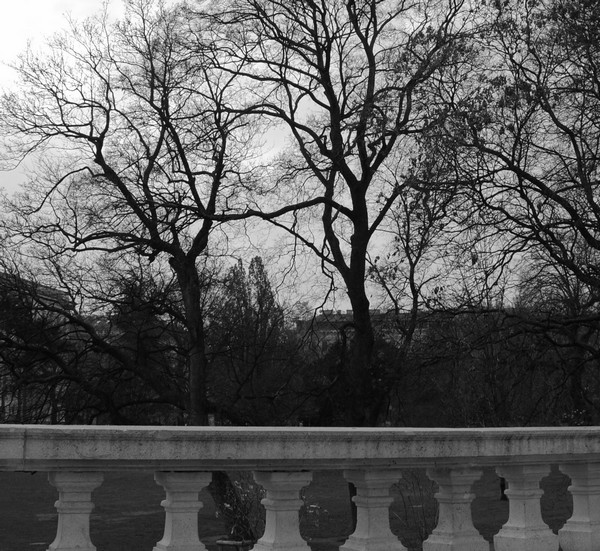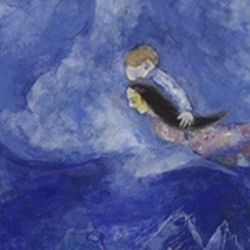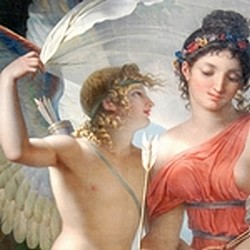
"Take with you Paul Verlaine's Fêtes galantes and this little magical book will return to you, gently, harmoniously and delightfully sad, the ideal and enchanted world of the divine master of love comedies, the great and sublime Watteau, that the 19th century has just rediscovered"
These words are part of a review of April 19, 1869, that the poet Théodore de Banville wrote after the publication of the poetry collection Fêtes galantes, by his friend Paul Verlaine. As the critic says, poems reflect the atmosphere of courtship of the paintings by Antoine Watteau (1648 - 1721), of which Verlaine might have known L'embarquement pour Cythère, which was already exhibited at the Louvre before the poems were written; However, scholars doubt that he knew other works by the painter because most of them remained in private houses. As Banville points out, that was the time of Watteau's rediscovering and Verlaine could have seen some works reproduced before the great exhibitions of some years later.
L'embarquement pour Cythère recreates the fêtes champêtres held at the French court during the Régence. Cythera is the Greek island where mythology places the birth of Aphrodite and the characters in the painting are going to pay homage to the goddess and celebrate love, encouraged by the amorini dedicated to join the couples (successfully, as the details of the painting show). The festive spirit of this work is shared by the first poem of Fêtes galantes, Clair de lune, and by those who follow it, in which we find music, dance, Pierrots, Colombines, nobles, shepherdesses, mythological characters, all of them in gardens as magnificent and unreal as Versailles should look at that time.
Verlaine's Fêtes galantes is an essential work for mélodie: Fauré, Debussy and Hahn lead a very long list of composers who musicalized some of its poems. Claude Debussy, for instance, set six of them into music: three, in 1891 (Fêtes galantes, FL 86) and three more in 1904 (Fêtes galantes, FL 114). Today we're listening to Colloque sentimental: the last poem of the collection, the last song of the cycle and the last song with poem by Verlaine.
I don't know which English word would fit the French “colloque” (suggestions are welcome), a dialogue, usually about an important matter, between two o more people. There are two people at the poem, and the dialogue seems to have different importance for everyone. They run into at the park and talk about their lost love. The splendour described in the first poems of the collection has disappeared; now the "ancient park" is "deserted and frozen" and instead of those men and women dressed in rich, bright clothes, there are only "two shapes"; "Their eyes are dead and their lips are lifeless," just as if they were two ghosts in a cemetery at night; I don't know any picture by Watteau that conveys so much desolation. The party is over and there is only the memory of a love that should have been everlasting. One of the shapes, that uses the familiar “tu”, recalls those happy moments with nostalgia; the other gets a distance by using the polite “vous” and answers laconically and pretending indifference.
Debussy's song conveys this sad atmosphere of the poem, the nostalgia and hope of one of the shapes, and the coldness of the other. It is a work full of nuances, and I have chosen to share with you the excellent version of Susan Graham and Malcolm Martineau; I doubted between two because I liked very much both singers, but the piano was the deciding factor; I really like the mystery and the feeling of unreality that Martineau gives to the song, as if the situation were a nightmare. I hope you like the song and the performance as much as I do.
If you fancy listening to some more song, this restrained piece, its atmosphere and minimalism make me think of two lieder, Die Stadt and Der Doppelgänger, Schubert and Heine also tell us about lost love. It also leads me to two more songs; as you can see, we have a handful of cherries this time. Some time ago, we listened to I fauni, the first song of Deità silvane by Respighi, a cycle that, somehow, presents us a similar world to that of the Fêtes galantes; at the last song, Creposcolo, time has passed, and an abandoned, decadent garden conveys the same sadness of Debussy's song. On the other hand, in Strauss's Allerseelen, the poetic voice recalls a lost love that he would like to recover even for just a day; Both members of the couple are present, although the second doesn't say a word, and the emotion of the former reminds me that of the character of Verlaine.
Dans le vieux parc solitaire et glacé
Deux formes ont tout à l'heure passé.
Leurs yeux sont morts et leurs lèvres sont molles,
Et l'on entend à peine leurs paroles.
Dans le vieux parc solitaire et glacé
Deux spectres ont évoqué le passé.
- Te souvient-il de notre extase ancienne?
- Pourquoi voulez-vous donc qu'il m'en souvienne ?
- Ton coeur bat-il toujours à mon seul nom?
Toujours vois-tu mon âme en rêve? - Non.
Ah ! les beaux jours de bonheur indicible
Où nous joignions nos bouches ! - C'est possible.
- Qu'il était bleu, le ciel, et grand, l'espoir!
- L'espoir a fui, vaincu, vers le ciel noir.
Tels ils marchaient dans les avoines folles,
Et la nuit seule entendit leurs paroles.
Please follow this link if you need an English translation.


 How to...
How to... About...
About... Few wee...
Few wee...











Comments powered by CComment